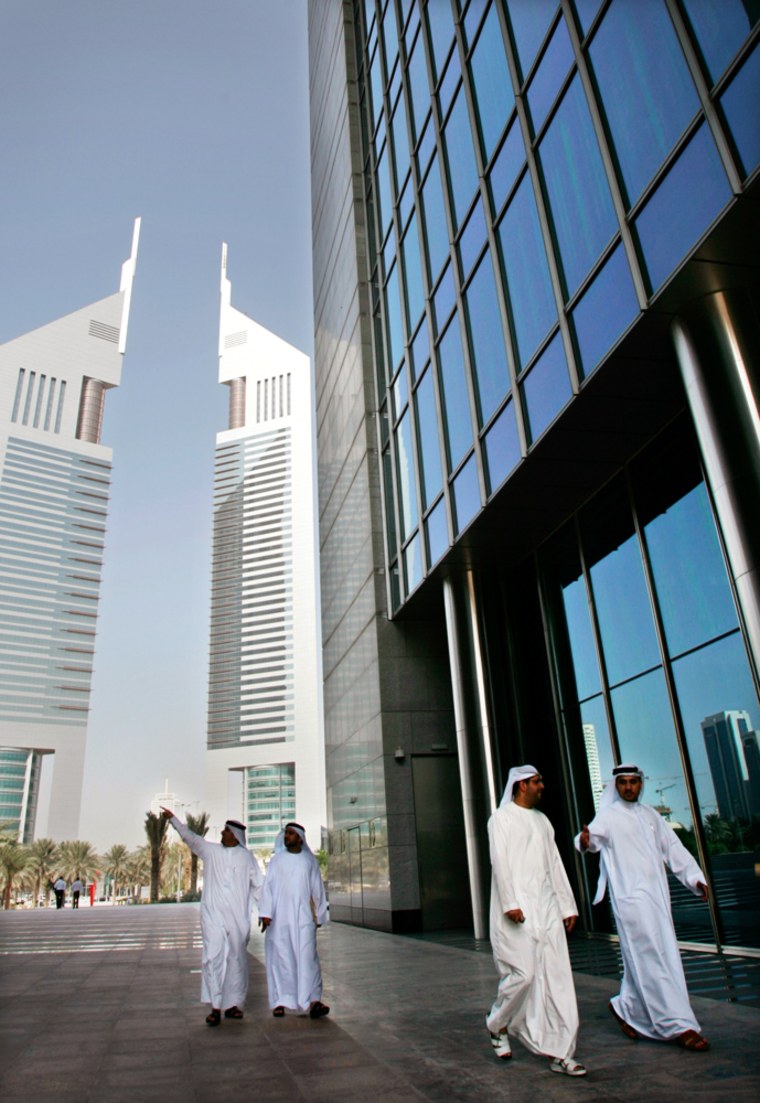The ports controversy is likely to send a chill among Arab businessmen, making them cautious about investing in the United States amid fears of an anti-Arab bias in the world’s biggest market.
The backlash may not be long term: Many analysts said Friday that the U.S. is too tempting an investment for the oil-rich Gulf businesses. But the postponement of trade talks between Washington and the United Arab Emirates may be the first sign of discontent.
The U.S. played down any connection between the delay of the talks — which had been due to start Monday — and the ports controversy. Neena Moorjani, spokeswoman for the U.S. Trade Representative, said both sides just needed more time to prepare.
Reem al-Hashimy, the commercial attache for the United Arab Emirates in Washington, said on CNN that the ports deal and trade talks were “entirely separate issues” and that the postponement of the talks will not delay the overall progress toward a free-trade agreement between the countries.
Still, the development prompted speculation that the government of this U.S. ally wanted to show its displeasure, at least symbolically. On Thursday, DP World — owned by Dubai, one of the seven emirates that make up the UAE — announced it would give up management of six U.S. ports after American lawmakers raised an uproar over security concerns.
UAE Central Bank Governor Sultan Bin Nasser Al Suwaidi was quoted Friday in the daily Gulf Today as saying the ports controversy could cause waves over the trade deal. “It is something that doesn’t reflect well,” he said.
For many in the region, the dispute is a reflection of what they see as U.S. anti-Arab sentiment and a particular slap to the UAE, a U.S.-friendly nation.
“This anti-Dubai venom is about race, religion and prejudice, not ports, security and politics,” Matein Khalid, an investment banker in Dubai, wrote in the Khaleej Times. Blocking the DP World deal “will strip bare our illusion that an Arab, a Muslim, can ever be a friend of America again.”
President Bush said Friday he was worried over the message the ports controversy will send to the Arab world. “In order to win the war on terror we have got to strengthen our friendships and relationships with moderate Arab countries in the Middle East,” he said.
Al-Hashimy said the U.S.-UAE military and commercial relationships would continue.
“I believe that the relationship will continue to be strong, because relationships that matter don’t crumble at the first bumpy ride,” she said on CNN.
Eddie O’Sullivan, Dubai-based editorial director of the Middle East Economic Digest, said the outcry that forced DP World to back down was “a sobering moment.”
Other Gulf investors will likely review their deals in the United States for fear they could come under scrutiny as well and may shy away from future investments, he said.
“People are going to have to be much more careful. There’s a fear they (members of Congress) may move on to other targets in the Arab world. If it happened once it can happen again,” he told The Associated Press.
Two UAE airlines recently signed orders for Boeing passenger jets. Few observers believe that deal will be called off, but Boeing may have to look elsewhere to make sales in the future, said Youssef M. Ibrahim, managing director of Dubai-based risk consultancy Strategic Energy Investment Group.
The ports controversy only “adds gasoline to the fire” of Arab resentment toward the United States, he said.
O’Sullivan said the UAE government was likely to take some steps to show its discontent and assuage its citizens’ anger over what they see as unjust treatment.
He said the ports fiasco will discourage the UAE-U.S. free trade deal. “Nobody is going to be in a big hurry to complete that now,” he said even before the delay was announced.
However, O’Sullivan said any response from the UAE will not be so strong as to hurt ties with the United States. He said the UAE is unlikely to deny the U.S. Navy and Air Force access to bases here, a prospect that has worried U.S. military leaders.
In the long term, the United States is too big a market for Gulf investors to shun. Last year, Dubai companies invested $5.5 billion in the West, much of that in the United States. In the next five years, countries in the Gulf will have $500 billion to invest.
While Asia and Europe offer plenty of opportunities, only U.S. assets can soak up so much money, O’Sullivan and other analysts said.
